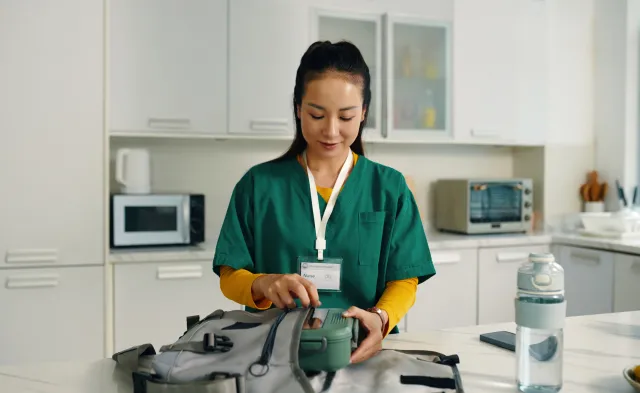Latest
Empathy in Action: A Day in the Life of an Assisted Living Nurse
Sep 26, 2023

The World Health Organization projects that the world’s population of people aged 60 years and older will double by 2050. As the number of elderly patients needing healthcare services rises, so does the urgency for proficient and empathetic assisted living nurses.
Assisted living nurses tirelessly provide care, comfort, and companionship to senior citizens in assisted living facilities across the United States. With numerous assisted living communities scattered nationwide, these dedicated healthcare professionals engage in consistent, life-affirming work each day.
The Profound Role of Assisted Living Nurses
Assisted living nurses are the foundation for assisted living facilities. Their impact stretches far beyond the confines of medical tasks; they embody both compassion and dedication as they ensure elderly residents receive the medical attention they require but also the emotional support that enriches their lives. These nurses play a pivotal role in creating an environment that fosters emotional well-being, comfort, and respect for seniors during their twilight years.
The life of an assisted living nurse is full of powerful connections, meticulously crafted care plans, and various responsibilities that can vary from day to day.
What is the Typical in the Day of an Assisted Living Nurse?
No two days are the same when you’re a dedicated assisted living nurse, but there is a rhythm and pattern to what you’ll encounter.
Morning: Welcoming the Day
The morning shift often starts with assessing the residents' well-being. Assisted living nurses begin by checking vital signs, administering medications, and addressing any immediate medical concerns. This initial interaction sets the tone for the day, as nurses greet residents with warmth and empathy, ensuring they start their day on a positive note.
Midday: Ensuring Comfort and Engagement
As the day progresses, assisted living nurses engage residents in various activities that promote their patients’ physical and mental well-being. From organizing group exercises to facilitating creative pursuits, these professionals create an atmosphere that fosters social interaction and engagement. They assist with meals, ensuring dietary preferences and restrictions are met, while also being attuned to any signs of discomfort or change in residents' health.
Afternoon: Collaborative Care
A significant part of the day involves collaborating with interdisciplinary teams, including doctors, nurse practitioners, therapists, and social workers. Assisted living nurses participate in care plan discussions, sharing their insights and observations to tailor comprehensive plans that cater to residents' unique needs. This ensures that every aspect of a resident's well-being is addressed holistically.
Evening: Comfort and Connection
As the sun sets, assisted living nurses help with evening routines, administer medications, and address any concerns that may arise before the day is over. Beyond the medical tasks, they offer a listening ear and companionship, recognizing the value of human connection, especially for those who might otherwise feel isolated. Assisted living nurses hope to end each day with the confidence that they have provided the highest care possible while preparing to do it all over again tomorrow.
Beyond Medical Care: Building a Community
Assisted care facilities are often the heart and soul of the communities, and the nurses who work there regularly establish meaningful relationships with residents and their families. Through their dedication — often going far beyond just supporting medical needs — these nurses create an environment where seniors feel valued, respected and cherished.
For those inspired to follow this path, Herzing University offers specialized programs designed to equip aspiring assisted-living nurses with the skills and knowledge required for this fulfilling career. Herzing’s nursing programs empower individuals to make a lasting impact on the lives of senior citizens, enhancing their overall well-being and quality of life.
Learn More About Our Nursing Programs
Bureau of Labor Statistics (BLS), U.S. Department of Labor, Occupational Employment and Wage Statistics 2023 / Occupational Outlook Handbook 2022. BLS estimates do not represent entry-level wages and/or salaries. Multiple factors, including prior experience, age, geography market in which you want to work and degree field, will affect career outcomes and earnings. Herzing neither represents that its graduates will earn the average salaries calculated by BLS for a particular job nor guarantees that graduation from its program will result in a job, promotion, salary increase or other career growth.
Latest
Recent Blog Posts
Subscribe to our Newsletter
Get the latest news you need to know, from study hacks to interview tips to career advancement. Have it delivered right to your inbox biweekly.








